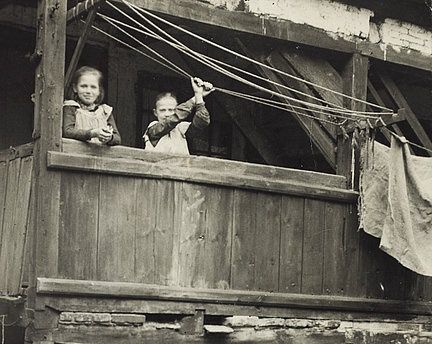Amongst the childhood memories of many of Denmark’s elderly are those of upbringings in the so-called ‘corridor apartments’ that once riddled Inner Nørrebro, one of Copenhagen’s most densely-populated working class neighbourhoods.
Their memories include sharing a toilet with five other apartments at the end of the hall, coping with sanitation so poor it led to a tuberculosis epidemic, and seeing rats scurrying around a yard while children played alongside. Unbelievably, many of these memories don’t just date back to the turn of the last century, but to the 1950s.
Since 1980, a massive renovation of the country’s worst slum areas has been underway, including places like Nørrebro. And while there are still a surprising number of apartments without bathrooms, rather than being the norm, as they were just 50 short years ago, they are now increasingly rare.
Getting organised
With housing conditions this bad for so long, you wonder why the tenants’ rights groups didn’t fight more for better legislation. Though the city’s first housing organisation, Københavns Grundejerforening (Copenhagen’s Founding Tenants’ Organisation), was started in 1857 and legislation for public housing was passed in Parliament as far back as 1887, tenants received very little protection from the law until the mid 1930s.
Attempts to organise citizens were made at the beginning of the First World War amid unimpeded speculation and an acute housing shortage, but the movement lacked power and fizzled out soon after. Somehow, the ability to organise came far more easily during the dark years of the mid-1930s, when mass unemployment and harsh poverty provoked the working classes into action.
It was social democratic politicians like Thorvald Stauning – later to become prime minister from 1924-6 and again from 1929-42 – who started the initiatives that forced Parliament into implementing some official form of rent control in June 1916. They neglected, however, to protect tenants against likely events such as eviction – correcting this gap in December of the same year. The law didn’t last long though, and by the end of the following decade had been abolished, allowing rents to rocket, doubling in many cases in the space of a year. The government allocated 109 million kroner in 1927 to building 27,000 new apartments, but this was cold comfort for those facing sky-high rent hikes.
Keeping it real
Many regard the legislation passed in 1937 as the first ‘real’ housing law, as it is this one that has provided the foundation for all those that have succeeded it – and there have been quite a few of them. As in many other areas of government, housing laws have been amended, watered down or in some instances scrapped completely since the 1937 act, only to be reinstated by future governments.
Government-owned housing does not exist in this country. The closest equivalent are the state-assisted housing associations. With long waiting lists for private applicants and quotas for sheltered elderly and handicapped accommodation as well as for the neediest members of a local government authority area, it is these associations that have built the low-cost housing and affordable rents for those who need it most.
One of the biggest of these organisations, as well as one of the oldest, is Lejerbo, which was formed in 1944 by the foreman of the national tenants’ association, Hans Andersen. He spent a large amount of time between 1940 and 45 touring the country, rousing tenants, reminding them of their rights and getting them organised. Taking the popular phrase “protect your home”, he added to it, thereby turning it into the slogan of the tenants’ rights movement: “Protect your home – and build it yourself.”
Merging into power
When four of the dominating parties in Parliament passed an amendment to the housing law in 1966 allowing tenants of housing association apartments to buy and thus own their property, it was seen by many as the biggest scandal in the history of housing politics. Though the occupants of the apartments remained unchanged, it narrowed the possibilities for the poorest and most vulnerable members of society to find a decent place to live.
That same year, two rival tenants’ organisations came to the conclusion that they were stronger as one and merged to form what is today the biggest such group, Lejernes Landorganisation (LO). With contingency fees for members offering legal help should the need arise, they have sub-groups all over the country, including one for the capital region here in Copenhagen.
Sanitation and bathing facilities may have improved, but a lack of housing in many urban areas, and illegally high rents that go unnoticed by many tenants, continue to provide the backdrop for the country’s advocates of tenants’ rights.
















